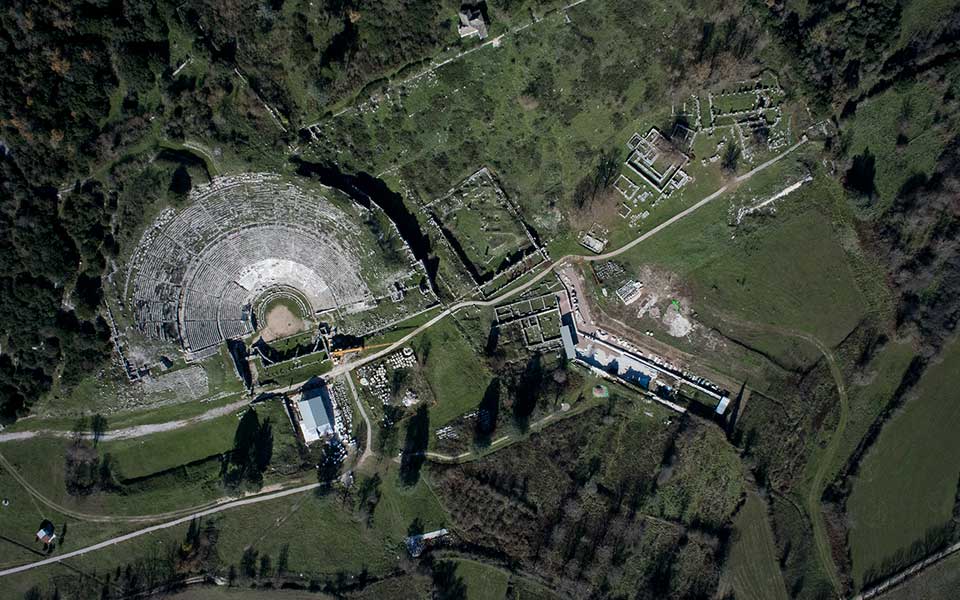Digital App Brings Acropolis Monuments Back to Life
The new Chronos app, which uses…

Aerial view of the Ancient Theater of Dodoni.
© Hellenic Ministry of Culture and Sports
In a recent announcement by the Greek Ministry of Culture and Sports, the Central Archaeological Committee (KAS) has given unanimous support for the continuation of maintenance and restoration works at the ancient theater of Dodoni in Epirus, northwest Greece.
The extended program will focus on the second and third “diazoma” of the theater, the concentric semi-circular rows of seats that form the two upper tiers of the large auditorium.
Since 2000, restoration works have been carried out on the first (lower) tier and other sections of the ancient monument. Experience gained during those earlier phases of restoration, including the creation of a database and detailed recording of the complex building pathology, will serve as a methodological framework for the extension program.
The theater of Dodoni, with its spectacular backdrop of the Pindus mountains, was one of the largest theaters in the ancient Greek world. Built in the 3rd century BC, during the reign of king Pyrrhus (297-272 BC), the monumental theater had a capacity of around 17,000 people, comparable in size to the theater at Epidaurus.
Located at the foot of Mount Tomaros, taking advantage of the natural incline, the theater formed an important part of the sanctuary of ancient Dodoni, dedicated to the cult worship of Zeus. During religious festivals, the sanctuary hosted athletic and equestrian competitions to honor the god, and dramatic performances of tragedy and comedy were staged in the theater.
Later, in the Roman period, the theater was adapted as an arena, used for gladiatorial games and “venatio,” the staged hunting and killing of exotic wild animals. In doing so, the first rows of seats were removed and a 2.8-meter high wall was erected to protect the audience from the animals.
Building on the successful conservation works of the last 20 years, and with the ongoing support of the Diazoma organization, the extended program at Dodoni aims to preserve and restore more of the theater’s auditorium, enabling greater numbers of visitors to attend public performances and events in the future.
Following the positive response from KAS, Culture Minister Lina Mendoni said: “The Sanctuary of Ancient Dodoni is one of Greece’s major archaeological sites, a place of great importance and interest.”
“With the approval of the Central Archaeological Council of the updated framework study, it is possible to move to a new and distinct part of the monument, the upper diazoma, the management of which is a key factor for the continuation of work on the whole monument. A constant priority for the Ministry of Culture and Sports is the continuation of the restoration works of the ancient theater, the protection and promotion of all the monuments of the sanctuary, the upgrade of the public service infrastructure, as well as the improvement of site security,” she added.
For more information about the ancient theater of Dodoni, visit here.
The new Chronos app, which uses…
The Zagori region in northwest Greece,…
Following 35 years of archaeological excavation…
French woman Jacqueline Junelles has voluntarily…